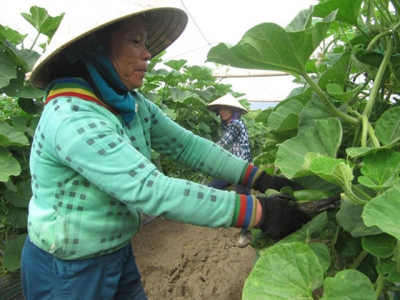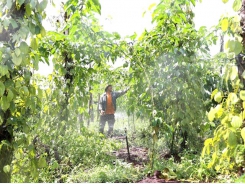Organic farms fuel sustainable development

Born in Dien Ban Town, Quang Nam Province, 37-year-old Duong Hien Tu has developed the area's first organic ecological agriculture system and a sustainable farming model over the past seven years to create the An Phu organic farm brand.
A farmer harvests vegetables at a farm outside Da Nang. Safe and healthy products from organic farms are a favourite among housewives.
As one of the first farming families in Go Noi, an agriculture-intensive area in the province, they began their adventure in organic farming on 2ha of land as part of a business-farmer co-operative model in 2012.
Farmers who made a living from traditional agricultural production for years were assigned to follow organic farming under strict regulations and responsibility-related contracts as well as market price guarantees.
Freshly cut organic vegetables at An Phu Farm in Quang Nam. Organic farming is seen as a positive step for sustainable farming development.
“It was a real change among traditional farmers in the region. They were told to use their skills and set prices themselves,” Tu said.
“Each family was put in charge of a segment in the production chain, including livestock, rice, vegetables and fish. Livestock farms now supply meat and bio-fertilisers for vegetables, while garden waste from herb farms is used to feed livestock,” he explained.
He said this helped farmers to reduce production costs by 35 to 40 per cent for chemical fertilisers and pesticides.
According to Do Huu Vinh, 69, a member of An Phu Farm, organic farming is a tough process because it takes more time.
A farmer checks his crops in central Vietnam. Organic farming takes more time than using chemical fertilisers and pesticides.
“Most farmers prefer to chill out after spraying chemical fertilisers and weedkillers. They leave their farms for days to enjoy weddings, parties and festivals, but organic farming needs daily care,” Vinh said.
“We switched to organic farming two years ago, and it's fresh and healthy. We stopped using toxic chemical fertilisers and pesticides. Now it's all about hard work and herb-based pesticides to clear harmful insects,” he explained.
Healthy farming
Nguyen Viet Binh, a farmer in Dien Phong Commune, said organic farming would be the sustainable choice for the future.
“Organic farming can be expensive due to labour costs, but we can work healthier on chemical-free fields. We can earn more on a small farm as organic products often sell for twice as much as chemical-based farms,” Binh said.
“Farmers ensure quality control and organic farming, while businesses ensure a stable price for safe farm produce. It helps reduce the risks from market fluctuations,” Binh added.
Hoang Hung, a biology engineer, believed that organic farming would continue to grow as people became more aware of where their food was coming from.
“Housewives look at quality rather than price. They want to know where the food they're feeding their children is from, and even visit the farms. This has pushed farmers to switch to organic methods,” Hung said.
The 23-year-old engineer, who works on a 5,000sq.m farm outside Da Nang, recycles garden and livestock waste to produce bio-fertiliser and bio-pesticides.
“Garden waste is fermented to produce bio-insect spray, while bees and ants help protect the farm from insect infestation. Earthworms are also to decompose organic waste,” he said.
The organic farm collective helps businesses reduce their initial investments by 20 per cent.
“Farmers offer land, seeds, skills, labourers and knowledge of agricultural production, while businesses ensure supply chain development, sales, technical assistance and quality certification,” Hung said.
Links
Vo Lam Vu, the owner of an organic farm in Mang Den in the Central Highlands province of Gia Lai, said building links among organic farms nationwide would help set a firm foundation for an organic growth wave.
A farmer plants vegetables in the central province of Quang Nam. The province has promoted organic farming among local and foreign investors, as well as hi-tech farming.
“It’s necessary. One organic farm by itself can't meet market demands, while shops need diversity for their products, ranging from vegetables, fruit, rice and seafood,” Vu said.
“Our farm, which turned to organic farming seven years ago, supplies on average 1.5 tonnes of safe farm produce – mainly roots and fruit – to Da Nang alone,” he said.
“Each farm specialises in key products, while others supply aquaculture, rice, or packaged coffee and tea,” he said.
He explained that organic farms would reduce the risks of market changes, while maintaining a stable income for farmers.
Do Thi Tuong Vy, manager of the An Phu Farm shop chain, said farmers held a 40 per cent share in the organic production chain.
“Each farming family can earn from VND12-14 million a month from organic farm produce. Poor families can also add to their coffers from making traditional cakes, pork and beef pies using materials from organic livestock and rice farms,” Vy shared.
She said a specialised livestock farm and processing plant had been built in Phu Ninh District to supply the central region market.
An organic sunflower field in Quang Nam Province. The site has helped boost the organic farm chain in central Vietnam.
Vy said the farm had built links with three other organic farms in the region to promote produce diversity.
Thai Van Quang, an agricultural expert, said organic farming was still seen as an emerging market as awareness of over-used chemicals and stimulants in cultivation was limited.
Quang said the city, in co-operation with Chikujo town and experts from Kyushu University and Saga University, Japan, had launched a pilot project to produce liquid fertiliser made from organic waste from farms and public gardens.
Tu said organic farming would be key for An Phu Farm for domestic and export markets in the near future.
He said organic production was not only about making money; farmers had a social responsibility to deal with serious health problems partly related to over-used chemicals, toxic weedkillers and pesticides. VNS
Related news
Tools

Phối trộn thức ăn chăn nuôi

Pha dung dịch thủy canh

Định mức cho tôm ăn

Phối trộn phân bón NPK

Xác định tỷ lệ tôm sống

Chuyển đổi đơn vị phân bón

Xác định công suất sục khí

Chuyển đổi đơn vị tôm

Tính diện tích nhà kính

Tính thể tích ao




 Organic food called worse for climate
Organic food called worse for climate  Central Highlands farmers adapt to climate change
Central Highlands farmers adapt to climate change